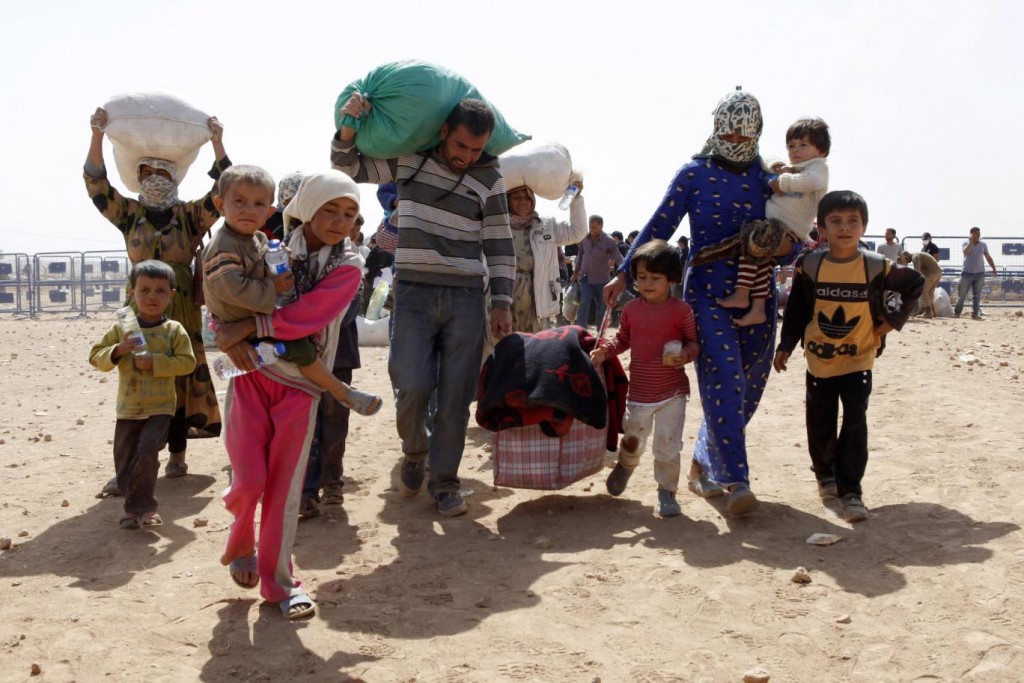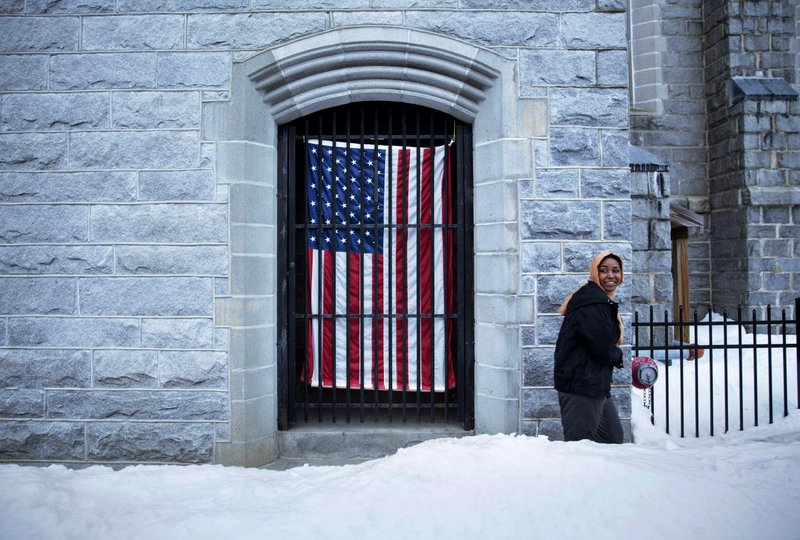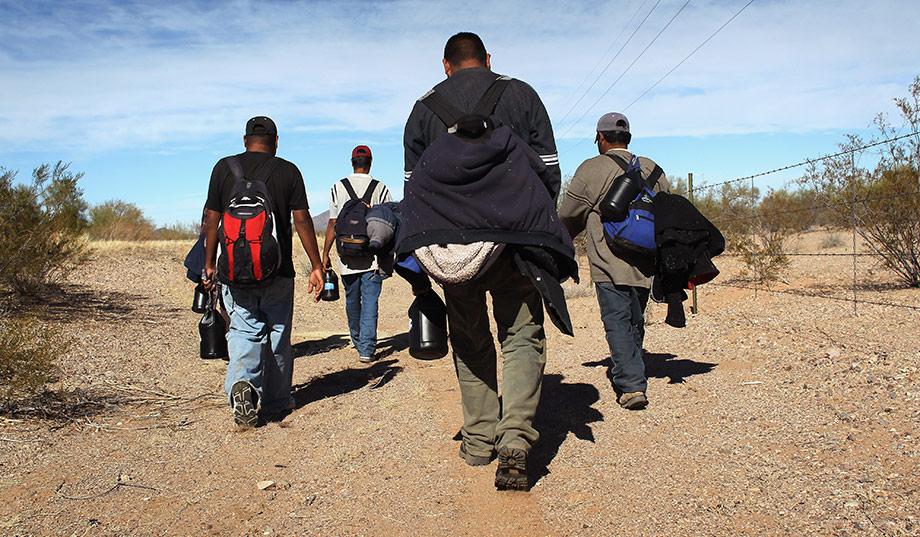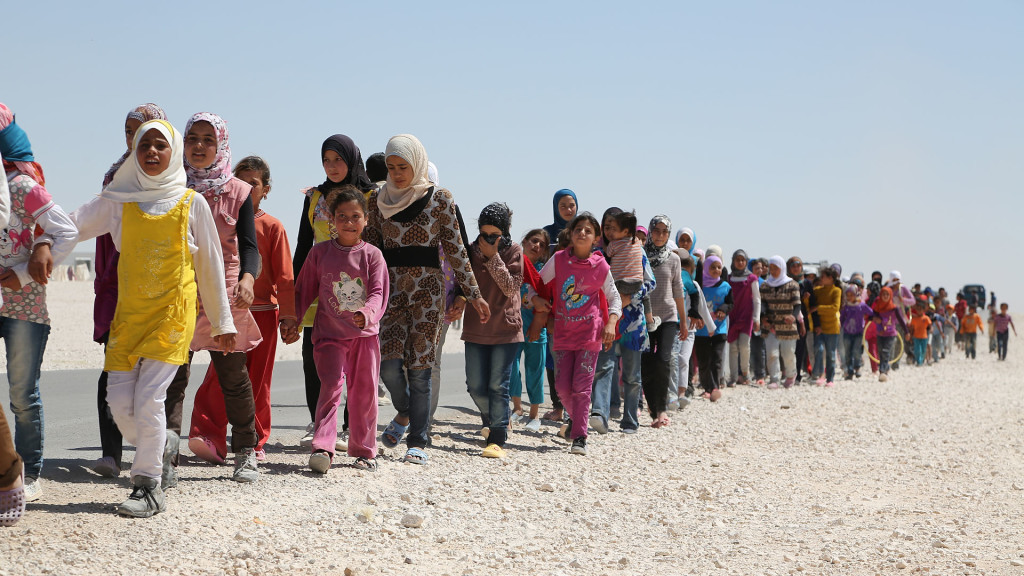Dana Hall McCain: The refugee question

Dana Hill McCain discusses the ongoing refugee resettlement question.
Donald Trump to look at even stricter cap on refugees

President Donald Trump is considering a further reduction in the number of refugees allowed into the United States as the administration works to re-shape American immigration policy, officials say. Trump has already slashed refugee admissions once since taking office. Now he faces a decision on how many to admit in the next budget year. As is often the case with the Trump administration, Cabinet officials are divided as they weigh the costs and potential security risks associated with the program. The Department of Homeland Security has been pushing for a reduction beyond the 50,000 maximum-entry mark set by Trump earlier this year as part of his travel ban executive orders — a number that is already the lowest in modern American history. In a proposal submitted late last week, the department called for a reduction to 40,000 refugees in the next budget year starting Oct. 1, citing concerns about its workload and ability to adequately vet those seeking entry. The State Department, which oversees the program, has formally recommended that the number be kept at 50,000, according to Trump administration officials who spoke on condition of anonymity in order to discuss internal deliberations. Agencies had been given until the close of business Wednesday to submit formal recommendations for consideration. State Department officials would have been inclined to set their recommendation higher, several of the people said, but were taking their cues from the president’s executive order and felt that 50,000 was the highest number that would be palatable to him. Trump has until Oct. 1, the start of the new fiscal year, to determine how many refugees to admit under the Refugee Act of 1980. He is expected to consider the issue over the weekend, after he finishes up at the U.N. General Assembly in New York, one White House official said. The U.S. welcomed 84,995 refugees in fiscal year 2016, and former President Barack Obama had wanted to raise that number to 110,000 in 2017. Trump has made limiting immigration the centerpiece of his policy agenda. He temporarily banned visitors from a handful of Muslim-majority nations, has rescinded an Obama-era executive action protecting young immigrants from deportation and insists he’ll build a wall along the southern border. During his campaign, Trump pledged to “stop the massive inflow of refugees” and warned that terrorists were smuggling themselves into naive countries by posing as refugees fleeing war-torn Syria. “Thousands of refugees are being admitted with no way to screen them and are instantly made eligible for welfare and free health care, even as our own veterans, our great, great veterans, die while they’re waiting online for medical care that they desperately need,” Trump said last October. Instead, Trump has advocated keeping refugees closer to their homes. In a speech to the United Nations on Tuesday, Trump thanked Jordan, Turkey and Lebanon for taking in hundreds of thousands of refugees from the Syrian conflict, and described the United States as a “compassionate nation” that has spent “billions and billions of dollars in helping to support this effort.” “We seek an approach to refugee resettlement that is designed to help these horribly treated people, and which enables their eventual return to their home countries to be part of the rebuilding process,” he said, arguing that for the cost of resettling one refugee in the United States, the U.S. can assist more than 10 migrants in their home regions. Advocates say that misses the point. “I think that these comments show a basic misunderstanding of the refugee crisis,” said Jen Smyers, who helps run the immigration and refugee program at Church World Service, one of nine organizations that work to resettle refugees in the U.S. She said the safe re-integration of refugees into their home countries is always the preferred outcome, followed by integration in a nearby country that shares a refugee’s language and culture. Resettlement is a last resort when those options are impossible. Refugees already face an extensive backlog and waiting periods that can take years. Smyers said that after Trump’s executive order, she had to tell refugees in the pipeline they’d be waiting even longer. “It’s devastating for refugees who are overseas,” she said. Stacie Blake, of the U.S. Committee for Refugees and Immigrants, said the proposed cutbacks were especially concerning given the migrant crises affecting so many parts of the world, including the Rohingya Muslim refugees fleeing Myanmar. She said Trump’s move could prompt other nations to “back out” as well. White House spokeswoman Kelly Love said in a statement that the administration’s approach to refugee resettlement “is unwavering” and would be “guided by the safety and security of the American people, the protection of U.S. taxpayers, and the application of U.S. resources in a manner that stretches our dollars to help the most people.” DHS spokesman David Lapan said that in setting the admissions ceiling, the agency would take into account the “workload capacity of all program partners, including the vetting agencies” as well as national security interests. Simon Henshaw, the top State Department official for refugees, said the decision was ultimately Trump’s. Republished with permission from the Associated Press.
Q&A: What’s next in the legal fight over Donald Trump’s travel ban?

Another appeals court, another defeat for the Trump administration. The San Francisco-based 9th U.S. Circuit Court of Appeals on Monday refused to reinstate President Donald Trump‘s executive order banning travelers from six mostly Muslim countries. A three-judge panel said the administration failed to show that blocking citizens from Iran, Libya, Somalia, Sudan, Syria and Yemen was needed to protect the U.S. The court also found that the president’s order ran afoul of an immigration law that prohibits discrimination on the basis of nationality. Another federal appeals court, the Virginia-based 4th Circuit, last month also refused to reinstate the travel ban, a decision Trump has already appealed to the Supreme Court. Here’s a look at how the rulings compare and what might come next. — HOW DO THE RULINGS DIFFER? Critics of the ban have asserted that the president’s order was motivated by anti-Muslim sentiment, in violation of the Constitution’s separation of church and state. The 4th Circuit’s ruling took that question head-on, agreeing that the ban officially disfavored Islam – as evidenced by Trump’s campaign statements calling for a “total and complete shutdown” on Muslims entering the U.S. – and was thus unconstitutional. But the 9th Circuit sidestepped that question, saying they didn’t need to answer it because the legality of the travel ban could be decided on narrower grounds: It violated immigration law. While the president has broad authority over immigration, the judges said, to invoke that authority in this case, Trump would have to show the entry of citizens from the six countries would harm the U.S. He made no such showing, they said. “National security is not a ‘talismanic incantation’ that, once invoked, can support any and all exercise of executive power,” the judges wrote. By avoiding the question of Trump’s motive for banning the travelers, the 9th Circuit avoided a thorny issue about whether courts should consider the president’s campaign-trail statements. The 9th Circuit, however, did not completely ignore the president’s statements. The judges pointed to a June 5 tweet by Trump saying the executive order was aimed at “dangerous countries.” That helped demonstrate that he was not assessing whether the roughly 180 million citizens of the six countries had ties to terrorism, they said. — WHAT ABOUT THE REFUGEES? In addition to banning travelers from six mostly Muslim nations for 90 days, Trump’s executive order called for a suspension of the nation’s refugee program. In his March ruling striking down the travel ban, a federal judge in Hawaii also held that the suspension of the refugee program was unconstitutional. The 9th Circuit rebuffed the administration’s efforts to reinstate that part of the order as well. The court said the president was required to consult with Congress in setting the number of refugees that would be allowed into the country in a given year and could not decrease that number mid-year. That issue wasn’t before the 4th Circuit, because in the Maryland case it considered, the lower court judge had not struck down the refugee program’s suspension. — WHAT COMES NEXT? Attorney General Jeff Sessions said after Monday’s ruling that the ban was necessary to protect national security, and the president was within his lawful authority to enact it. White House Press Secretary Sean Spicer said the administration was confident that the travel ban would be upheld by the U.S. Supreme Court. The administration has asked the Supreme Court to immediately reinstate the ban on travelers. At the Supreme Court, anything is possible if you have five votes – a majority of the court. The justices have a range of options in front of them. They could order an unusual June argument and try to resolve the travel ban lawsuits before they leave town for the summer. They also could essentially do nothing, leaving the two appeals court rulings in place. One reason the court might feel some responsibility to act – and sooner rather than later – is because the administration has asked for expedited review. The court typically also has the last word when a federal court strikes down a law or presidential order. The 9th Circuit’s more narrow focus on immigration law may appeal to conservative justices on the Supreme Court who might be loath to extend their review beyond the text of the executive order to include the president’s campaign statements about a Muslim ban, said David Levine, a professor at the University of California, Hastings College of the Law. “They don’t need to psychoanalyze the president,” he said. “They don’t need to go beyond the four corners of the order.” Republished with permission of The Associated Press.
How communities shaped by refugees became Donald Trump country

Richard Rodrigue stood in the back of a banquet hall, watching his blond-haired, blue-eyed daughter mingle among her high school classmates. These teenagers speak dozens of languages, and hail from a dozen African nations. They fled brutal civil war, famine, oppressive regimes to find themselves here, at an ordinary high school pre-prom fete in this once-dying New England mill town, revived by an influx of some 7,500 immigrants over the last 16 years. Rodrigue smiled and waved at his daughter, proud she is a part of it: “It will help her in life,” he said. “The world is not all white.” Rodrigue believes the refugees resuscitated his town — plugging the population drain that had threatened to cripple it, opening shops and restaurants in boarded-up storefronts. But he also agrees with Donald Trump that there should be no more of them, at least not now. America is struggling, he says, and needs to take care of its own before it takes care of anyone else. His working-class community, built along the banks of the Androscoggin River in the whitest state in America, is a place that some point to as proof that refugee integration can work. And yet for the first time in 30 years, voters in Androscoggin County chose a Republican for president, endorsing Trump’s nativist zeal against the very sort of immigrants who share their streets and their schools. Rodrigue knows he was born on the winning end of the American dream. His grandfather fled poverty in Quebec and moved to Maine to toil his whole life in the textile mills. He never learned English, faced hate and discrimination. Two generations later, Rodrigue owns a successful security company, lives in a tidy house in a quiet neighborhood and makes plans to send his daughter to college. Immigration worked for him. But it feels different today, as the county of 107,000 people tries to find its footing. The sprawling brick mills that line the river sit mostly shuttered. A quarter of children grow up poor. Taxpayers pick up the welfare tab. So Trump’s supporters here tie their embrace of his immigration clampdown to their economic anxieties, and their belief that the newcomers are taking more than they have earned. “There’s got to be a point in time when you have to say, ‘Whoa, let’s get the working people back up. Let’s bring the money in.’ But they keep coming, keep coming,” Rodrigue said. His community has been an experiment in immigration and all that comes with it — friendships, fear, triumphs, setbacks — and he knows that Trump’s presidency marks another chapter in that struggle for the American soul. “I guess it just boils down to: What’s enough? Is that wrong? Am I wrong? Am I bad? That’s how I feel.” ___ No one invited the Somali refugees to Lewiston. They fled bullets and warlords to eventually be chosen for resettlement in big American cities, where they were unnerved by the crime and drugs and noise. In early 2001, a few refugee families struggling to afford housing in Portland ventured 30 miles north and found a city in retreat. Empty downtown stores were ringed by sagging apartment buildings no longer needed to house workers because so few workers remained. The refugees saw possibility in Lewiston’s decay. Word spread quickly, and friends and families followed. The town morphed in a matter of months into a laboratory for what happens when culture suddenly shifts. Maine’s population is 94 percent white, and its citizens were abruptly confronted with hundreds of black Muslims, traumatized by war and barely able to speak English. Ardo Mohamed came to Lewiston in 2001. She fled Mogadishu in the 1990s, when militiamen burst into the home she shared with her parents and nine siblings, and started shooting. She watched her father die, as the rest of the family escaped into the woods. They wound up in overcrowded refugee camps, separated for years, then finally Atlanta, then Lewiston. Now she fries sambusas with her sister at a shop she owns downtown. “We wanted to be safe,” said the mother of five, “just like you do.” When the refugees began arriving, Tabitha Beauchesne was a student at Lewiston High School. Her new classmates were poor, but Beauchesne was poor, too. She grew up in a struggling family in housing projects downtown. It felt to her then, and it still feels to her now, that the refugees got more help than her family. “They just seemed to take over,” she said. She doesn’t consider herself racist, though acknowledges that race and religion likely play a role in her sense that the refugees overwhelmed her community. The African Muslims, many of whom wear hijabs, stand out far more than her French-Canadian ancestors did when they arrived generations ago, she said. That perception — one of being inundated by a culture so different from her own — ingrained in her a sense of injustice so deep it persists to this day. She’s now a stay-at-home mother of two, and she left Lewiston to move to another school district in the county because she believes the refugee students monopolize teachers’ attention. Once a Barack Obama supporter, Beauchesne turned to Trump — and she cheers his efforts to curb the flow of refugees into the United States. She wants Trump to design a tax system that funnels less of her money to aiding those from other countries. “I just don’t like giving money away that’s not benefiting me and, not to sound selfish, but then seeing it benefit other people,” she said. “As a business owner, my husband wouldn’t donate $500 to the Salvation Army if we couldn’t afford it. Our country needs to do the same thing.” Taxpayers do help refugee families. Maine offers a welfare program called General Assistance, a combination of state and city funds, which provides impoverished people with vouchers for rent, utilities and food. In 2002, at the beginning of the immigrant influx, the city handed out about $343,000
Poll: Americans divided on admitting refugees

Where immigrants are concerned, James Wright is OK with people who are here legally, as well as illegally – if they haven’t committed crimes. But turn the talk specifically to the risks and benefits of admitting refugees to the U.S., and the New Jersey resident gives a fraught sigh. “It’s hard not to be conflicted,” said Wright, 26, an independent who supports President Donald Trump’s proposed travel ban on certain foreigners. “By no means do I want to be cruel and keep people out who need a safe place. But we have to have a better system of thoroughly finding out who they are.” Wright is part of a group of Americans a new survey suggests are making distinctions between legal immigrants who choose to be here and refugees – who are legal immigrants, too – fleeing persecution in their home countries. A new poll by The Associated Press-NORC Center for Public Affairs Research reflects that divide, with two-thirds of the respondents saying the benefits of legal immigration generally outweigh the risks. But just over half – 52 percent – say refugees pose a great enough risk to further limit their entry into the United States. Interviews with some of the poll’s participants suggest the distinction may be one of perception in an age of religious and politically inspired violence and 4.8 million refugees fleeing war-scarred Syria. “Sometimes the vetting might not be quality,” said Randall Bagwell, 33, a Republican from of San Antonio, Texas, the state second to California in settling refugees between Oct. 1 and Jan. 31, according to the State Department. “Nobody can do quality control when they’re just reacting immediately.” President Donald Trump has long linked tougher immigration limits to a safer country, and on Monday signed a new travel ban that, in part, will suspend refugee travel to the U.S. for four months except for those already on their way to the United States. The new order, which takes effect on March 16, will impose a 90-day ban on entry to the United States for people from Sudan, Syria, Iran, Libya, Somalia and Yemen – all Muslim-majority nations – who are seeking new visas. It was Trump’s second effort at a travel ban. The first was blocked by the courts. Also reflecting his hard line, Trump last week announced to Congress a new office to aid Americans and their families who are victims of immigrant violence. That’s despite years of studies that have shown that immigrants are less likely to commit crimes than U.S.-born people. Much of Trump’s candidacy and young presidency have been powered by the idea that he will protect Americans from “bad dudes” who want to come here, issuing a mix of tough, if vague, policy – from “extreme vetting” to the travel ban, a border wall with Mexico and more. Americans report conflicting feelings about immigrants just over six weeks into his presidency, the poll suggests. On the one hand, Americans see refugees as a risk apart from other legal immigrants, with a third of Democrats and 8 in 10 Republicans saying the risks are great enough to place more limits on refugees admitted to the U.S. Despite those fears, Americans still see legal immigration generally as a boon, the poll shows. More than 6 in 10 say a major benefit of legal immigration is that it enhances the reputation of the United States as a land of opportunity. The good and bad of immigration has long been a painful and intensifying national debate. Trump has shown some flexibility – or inconsistency, depending on one’s viewpoint – on his approach. For example, Iraq is no longer on the list of countries whose people are banned. Officials from the Pentagon and State Department had urged the White House to reconsider given Iraq’s key role in fighting the Islamic State group. Also, the new order does not subject Syrians to an indefinite travel ban, as did the original. Trump also has minimized talk of deporting all of the estimated 11 million people in the U.S. illegally and suggested that he could be open to comprehensive immigration reform. That sparked both interest and skepticism on Capitol Hill, where a solution has stymied Congress for years. But Trump’s warnings about refugees in particular apparently have stuck in the American consciousness, according to the poll. Refugees entering the U.S. undergo rigorous background checks, including a search of government databases that list people suspected of having ties to terrorist groups. Processing of refugees can take up to two years – and usually longer for those coming from Syria. After a year in the U.S., refugees are required to check in and obtain green cards. But U.S. officials have acknowledged that information on people coming from Syria, in particular, may be limited. Mandy Gibson, 37, sees the benefits of admitting legal immigrants – but isn’t so sure about refugees. “Maybe it’s the media. They are making refugees sound like they aren’t legal immigrants and I don’t necessarily understand, but they are different to me,” said Gibson, who works in a Greensboro, North Carolina, grocery store. Either way, she said, “anybody who is coming from countries that have ISIS really should have a very thorough background check.” — The AP-NORC poll of 1,004 adults was conducted Feb. 16-20, using a sample drawn from NORC’s probability-based AmeriSpeak panel, which is designed to be representative of the U.S. population. The margin of sampling error for all respondents is plus or minus 3.9 percentage points. Republished with permission of The Associated Press.
Federal appeals court will hear April arguments in Alabama’s refugee lawsuit

A federal appeals court will hear oral arguments in April on Alabama’s lawsuit against the federal government over refugee placement. The Montgomery-based 11th Circuit Court of Appeals announced a tentative argument session set for the week of April 24. The arguments were scheduled for appeal after a federal judge dismissed the state’s lawsuit that claimed the federal government didn’t ask for Alabama officials’ input about the settlement of Syrian refugees. The consultation is a requirement of the Refugee Act of 1980, according to Gov. Robert Bentley. Bentley announced his refusal to relocate the refugees following the Paris attacks in November 2015. Stating that unless federal officials provided background check and medical information to the state, they were not welcome in the Yellowhammer State. In July 2016, Chief United States Magistrate Judge John E. Ott ruled the state’s claims were too vague, and issued the dismissal, writing that the Refugee Act of 1980 did not allow states a right to a cause of action to enforce the law. “As your governor, I will not stand complicit to a policy that places the citizens of Alabama in harm’s way,” Bentley said in a news release. “The District Court based its dismissal on a technicality, a finding that Alabama may not sue to enforce the Refugee Act; the District Court did not find that the federal government was fulfilling its obligations under the Act.” The state filed the appeal in August 2016.
Federal government seeks to dismiss Alabama’s Syrian refugee lawsuit

On the heels of a Texas losing its fight against the resettlement of Syrian refugees in the state, the federal government is seeking to dismiss a similar lawsuit brought by the state of Alabama. Both Texas and Alabama sued the federal government in January over unwanted Syrian refugee placement in their respective states, seeking to block the arrival of people fleeing the war-torn country. On behalf of the federal government, a lawyer filed notice of the Texas court decision on June 16, asking once again that the case be dismissed. The following day, lawyers for the state of Alabama argued the differences in their case and asked that it be continued. In January, Alabama Gov. Robert Bentley filed a lawsuit on behalf of the state of Alabama, stating federal officials are in violation of the Refugee Act of 1980, which he contends requires a consultation with states regarding the placement of refugees before those refugees are placed within its borders. This, despite the fact that U.S. Supreme Court precedent has held repeatedly that matters of immigration and asylum are the responsibility of the federal government. “As governor, the Alabama Constitution gives me the sovereign authority and solemn duty to protect the health, safety and welfare of all citizens of Alabama. The process and manner in which the Obama Administration and the federal government are executing the Refugee Reception Program is blatantly excluding the states,” Bentley said in January when he filed the suit. Bentley made national headlines when he was among the first of several Republican governors to declare they would not accept refugees from war-torn Syria within their states’ borders. Watch Gov. Bentley’s lawsuit announcement from January below:
Jonathan McConnell: The problem with the EU’s new refugee plan

The first lesson you learn in Economics 101 is that people respond to incentives. Whether we’re talking about insurance, welfare, or hiring a new employee–incentives matter. That doesn’t change when we start talking about immigration or the refugee situation in the Middle East. Right now the incentives involved in the migration and refugee problem do not align with the stated goal of creating a stable region and minimizing human rights atrocities. I recently returned from a business trip to Turkey, from where millions of refugees have fled in the last several years into Greece and other members of the European Union (EU). Today an arrangement between Turkey and the EU went into effect, sending more than 200 people back to Turkey from Greece, in an effort to stem the flow the wave migrants and refugees that has begun choking the EU in recent years. Under the agreement, for every certified Syrian refugee sent to Turkey, one must also be sent for permanent settlement in the EU. Of the migrants sent back to Turkey today, not a single one was a Syrian refugee. The EU, Turkey, and Greece can contemplate how to halt the flow of migrants all they want, but it will not work until those nations, with backup from the United States, stop incentivizing bad behavior and empower Turkey and Syria to take matters into their own hands. The acceptance of hundreds of thousands, even millions, of refugees has allowed ISIS, with its relatively small fighting force, to gain a significant foothold in Syria—and they’re moving toward Turkey. Much how the United States’ immigration policy, or lack thereof, of allowing illegal immigrants to collect benefits and stay in the country with little or no negative ramifications has encouraged illegal immigration and stifled legal immigration, not incentivizing Syrians and Turks to stay and fight for their own nations will leave a negative impact across the globe. In Hamburg, Germany, for example, there are three Immigration camps which have effectively taken over those portions of the city. The police are reportedly not allowed to go into those portions of the city, and German citizens are leaving their homeland at a rapid rate. They feel their homeland has been taken over and do not feel safe. We are not going to stop the mass exodus of refugees without fixing the underlying tensions and problems. Simply shuffling refugees around the globe without a plan to require the Syrian and Turkish people to take responsibility for their land will only worsen the problem. After all, if a massive amount of people want to come to the United States because it is the land of opportunity, then why would we are only further incentivizing Syrians to flee their country by giving them a fast-track option through declaring refugee status. Syria is just one troubled area. There are an estimated 60 million refugees worldwide who are displaced from their homes. Europe is getting refugees from Libya, Algeria, Tunisia, and other North African countries, all displaced due to insecurity in their homeland. Whether the refugees are here in the United States, in the EU, or in Turkey, all of this insecurity, from the Middle East to Africa, can be credited to the Global Jihad Movement. The world must first recognize the Global Jihad Movement, then strengthen its resolve to destroy it. This effort must be led by Arab countries. Arab countries must take the lead in ridding the world of this radical ideology. For the U.S. to continue to meddle in the Middle East without Arab leadership is only to embolden Jihadist into fighting against an invading force. Politics aside, we may be divided on economic and social policy, as a world, we must unite to protect our way of life. The atrocities of Belgium and Paris are a mere body of water away. • • • Jonathan McConnell is the owner of Meridian Global Consulting, LLC, a maritime security firm, a Marine, and a former Republican U.S. Senate candidate.
Martin Dyckman: They pander the repulsive to the bigoted

The letters, mailed from Vienna in the summer of 1938, spoke of enthusiasm and hopefulness at the prospect of coming to the United States. Nothing revealed the reason except for the stationery that had been hand-altered to show a new address. It was a few months after Hitler had taken over and life was becoming as difficult for Jews in Austria as in Germany. The letters had been sent to relatives in Brooklyn and were in my mother’s papers when she died nearly a half century later. I had them translated from the German. Dr. Jakob Neuer, a lawyer, assured his kin that if they sponsored them, he, his wife and their 13-year-old son, Richard, would not need charity in the United States. “We Neuers want to work,” he wrote. There was one problem. Although he was considered German and qualified for an early visa, his wife was classified Polish. For her, there was a three-year waiting list. The quota had been established in large part to keep Jews out. The Neuers did not have three years. They made it only as far as France, where safety was short-lived. Jakob and his brother, sister-in-law and nephew died in Auschwitz. Richard helped his mother escape to Switzerland and spent the war living by his wits in southern France. In a novel he wrote in French years later, he described an American consul in Vichy France as ever so courteous, always smiling, always saying maybe later. In fact, maybe later meant never to the anti-Semites at the State Department. In 1939, about 900 Jews boarded the steamship SS St. Louis at Hamburg, bound for Cuba, expecting eventually to reach the United States. But the Cubans reneged on the visas they had sold them. They turned the ship away. So did the United States. When it reached Miami, the Coast Guard patrolled the harbor to make sure no one swam for shore. President Franklin Roosevelt ignored their appeals. Although he was a German, ship captain Gustav Schroder refused to take his despairing passengers back to Hamburg. He docked at Antwerp, where Great Britain, France and other western European nations agreed to accept the refugees. By the end of the ensuing war, the Nazis had murdered 250 of them. Polls from that period showed the American public strongly opposed to admitting Jewish refugees, even when the proposal was to take only 10,000 children. It was left to the British to do that. All this comes to mind, with stomach-wrenching disgust, with the news of Jeb Bush and other politicians calling for discrimination against Muslims in admitting Syrian refugees to the United States. Then, the pretext was that the Jews might include German spies. Never mind that the U.S. abounded with native-born, German-speaking Nazi sympathizers. Now, the pretext is that there might be terrorists among the Syrian refugees. Never mind that it was a fake Syrian passport found with one of the Paris terrorists or that they were all European citizens, not refugees. And never mind the eternal shame for closing our borders to Hitler’s intended victims. Unlike Ted Cruz, Donald Trump, and Chris Christie – who give new meanings to the word “vile” – Bush attempted to clarify his initial statement calling for preference to Syrian Christians. He said he supports welcoming women, children and orphans of any religion. But what about Muslim men? Does Bush mean to keep them out and let only their wives and children in? How does that comport with family values? But at least he’s a shade better than Christie, who said he would not permit even “a 3-year-old orphan” into his state. “Today’s Syrian orphan, it seems, is 1939’s German Jewish child,” said an Internet posting from the Baptist Joint Committee for Religious Freedom. Any form of religious discrimination is an insult to the American flag. No one who stands for that sort of vetting deserves to sit on a soil and water conservation board, let alone in the Oval Office. Mea culpa. I wrote earlier this month that Bush, unlike the candidates atop the Republican popularity polls, would be a “credible successor to the Oval Office.” Now, he is explaining yet another rash statement and is also calling for sending U.S. troops into Syria. Has he learned nothing, nothing from his brother’s ghastly blunder? It must be in the genes. President Obama called this one right. “When I hear folks say that, well, maybe we should just admit the Christians but not the Muslims, when I hear political leaders suggesting that there would be a religious test for which a person who’s fleeing from a war-torn country is admitted, when some of those folks themselves come from families who benefited from protection when they were fleeing political persecution, that’s shameful. That’s not American. That’s not who we are. We don’t have religious tests to our compassion.” But it appears that some of us do, including a few who fancy themselves fit to be president. Either they are cowards, catering to the undisguised bigotry and frothing xenophobia that represents a sizable segment of Republican voters, or they are simply bigots themselves. None deserve any decent citizen’s vote. Martin Dyckman is a retired associate editor of the newspaper formerly known as the St. Petersburg Times. He lives near Asheville, North Carolina.
America’s children need to be the priority in the immigration debate: guest opinion
Let me tell you about my idea of a perfect world. It’s where the United States is a nation with a thriving economy. Where all able-bodied Americans are in the workforce. It’s a nation where we, as citizens, control our own money, and the size and scope of the government is as limited as our founders intended. It’s a place where the majority instead of the minority of people engage in community involvement and volunteerism. Where the political process isn’t just about election time but is about holding our elected officials accountable at all times and involves an informed electorate. Crime is low in the U.S. Philanthropic giving is high. No child goes hungry. No child is left in an abusive home, on the streets, or in unloving group settings. Our education system is the best in the world and our nation is on the forefront of science, technology, space exploration, the arts and music. It is in this world that if refugees came by the thousands we could find them shelter, provide them resources, and as communities we could integrate their needs into ours and once again be the great melting pot. That’s just not the case today though. We have millions of families relying on billions of dollars in welfare including housing, food, and medical assistance. We have an education system that throws good money after bad and leaves kids in failing schools that only seem to get worse over time. Right here in the Birmingham area we have impoverished neighborhoods sitting just on the outskirts of some of the wealthiest areas in the state. We have children who don’t own books, don’t know where their next meal is coming from, and don’t have the comfort of safety in their own houses. Which brings me to the problem at hand, children flooding into our nation by the hundreds and totaling beyond thousands. First let me be clear, no one objecting to the massive influx of illegal children has a problem with the children themselves. I believe we can all, regardless of political affiliation, say we want the best for these kids, but our obligation rests first on the children and citizens legally living in our nation and facing poverty, hunger and illness. One of the defining features of our nation is that we have a government defined by our constitution and held together by the rule of law. When we start picking and choosing which laws to follow and when to follow them, even based on “humanitarian” reasons, our nation doesn’t stand a chance. I know, I know, we are talking about minors here. The idea of thousands of children hauled through multiple countries by mules and human traffickers is simply too much for me as a mother to even consider. I can’t imagine the fear and confusion that the young ones are facing. Many made this trip alone only to find themselves housed in massive detention facilities without familiar faces. That doesn’t change the reality that we as a nation aren’t in a position to house, feed and provide for these children. We aren’t a nation of unlimited resources and endless support. We must look no further than the most depressed and crime-ridden neighborhoods within our own region to know this. I’m all for helping others once we have our own system figured out. But in the meantime, we aren’t doing anyone any good by overburdening an already-taxed system. We need to return these children to the nations that they came from. To slow the numbers, we need to secure our border, and then seek to increase penalties for those found in our country involved in human trafficking. Our state department needs to cut off aid and support to those who refuse to accept their responsibility and attempt to put these families back together. As for those children who are here and have family already living in the shadows expecting to be reunited with them, we should allow those families the opportunity to come forward and return home with their children. This crisis isn’t a Republican or Democrat problem. No one wants harm brought to these children but we cannot ignore our laws, open the floodgates and welcome those we aren’t able to care for — at least not until we are able to ensure that every child already here has the resources they need to thrive, grow and pursue the American dream. This column appeared first on AL.com. Apryl Marie Fogel is a new Alabama resident who works as a conservative political activist.


